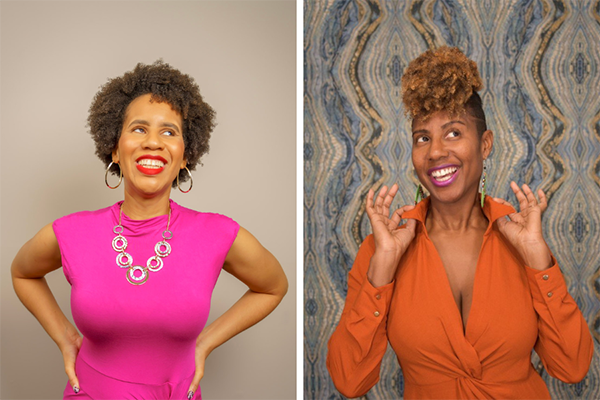Unleashing untapped talent: How these North Carolina small business owners are spreading the word about the benefits of inclusivity

Sisters Lakila Bowden and Kamille Richardson are reframing disability and disproving myths that providing accommodations for differently abled employees is expensive and burdensome to businesses through their consulting company, iSee Technologies.
Lakila and Kamille started their small business out of necessity. While Lakila found herself on a traditional path after college, joining the ranks of corporate America, Kamille–who was born blind–struggled to find a career. Kamille ended up in the field of massage therapy after facing rejection when applying to corporate jobs where people feared she would not be able to do the job due to her blindness or that too many accommodations would need to be made.
In addition to working as a massage therapist, Kamille began providing assistive technology training for people who had lost their vision at the Department of Health and Human Services in North Carolina.
Meanwhile, Lakila was transitioning out of her corporate job. The two teamed up and began doing IT contracting and training, but their business model soon began to focus on innovative inclusivity. They zeroed in on how employers could create more inclusive environments, practice more inclusive hiring, and improve workplace wellness.
Kamille says, “Working with people who had recently lost their sight, and of course from my lived experience, I realized there was a huge gap in employment. Unfortunately, there is a really high unemployment rate in the disabled community.”
The sisters explain that creating an inclusive workplace for differently abled people shouldn’t be seen as any different than creating an inclusive workplace for any other employee.
Kamille explains, “People look at inclusivity through a lens of limitation, but we teach that inclusivity is about unlocking people’s capabilities, which provide value for companies. It is all about creative problem solving.”
In fact, hiring people who are differently abled and making the appropriate accommodations actually proves to be good for the bottom line. Kamille and Lakila find that productivity increases when you have people with disabilities on staff and revenue can even increase in the sisters’ experience. Additionally, turnover rates for people with disabilities tend to be much lower than average.
Lakila and Kamille have an impressive roster of clients from BASF Chemical Company to the U.S. Environmental Protection Agency. A lot of their trainings are virtual, which helped them stay in business throughout the pandemic.
Kamille has also developed a career in public speaking. She hosts fireside chats and gives a keynote speech at conferences and events titled, “The Magic of Being Differently Abled: A reframe of disability.”
She explains, “People often look at giving support to the blind or disabled as charity, but we have to shift our lens to ask, ‘What can people with disabilities contribute?’ Businesses have the ability to access a wealth of untapped talent.”
Additionally, Lakila runs a program called, “Business without burnout bootcamp,” where she teaches women small business owners the importance of self care.
She says, “Society has adopted a hierarchy of priorities for women that puts us at the bottom. We have to give ourselves permission to prioritize our self-care in pursuit of our goals. Our power is in the permissions we give ourselves.”
Lakila and Kamille are invested in helping businesses of all kinds thrive. They are stakeholders with the The Russell Center for Innovation and Entrepreneurship, which is designed to support the growth of African American entrepreneurs and are a part of the Ascend National Cohort.
For Kamille, being an entrepreneur means empowerment. Before being a business owner, she felt as though she was settling for her career because no one was willing to believe in her.
She says, “Taking the nos I received from people, and turning them into yeses for myself is where my real power comes from.”
October is National Women’s Small Business Month, Blindness Awareness Month and National Disability Employment Awareness Month.
